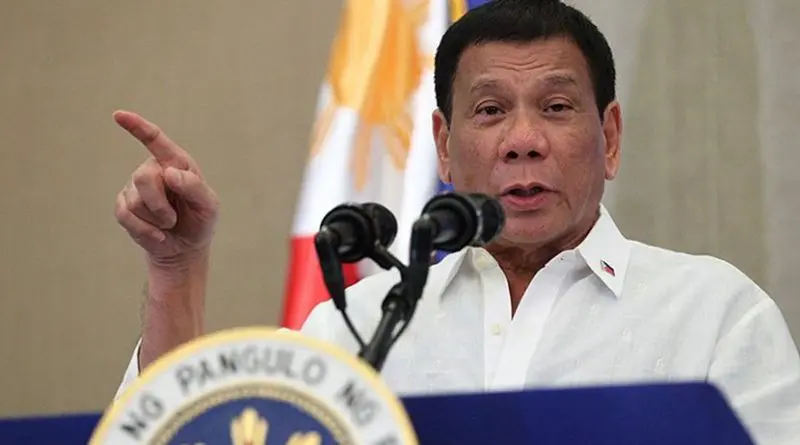Philippines: Duterte Promises Muslims He Will Sign Autonomy Law
By BenarNews
By Richel V. Umel and Jeoffrey Maitem
President Rodrigo Duterte on Monday assured minority Muslim leaders in the country’s south that within the next 48 hours he would sign a law giving them expanded autonomy, as he had promised two years ago.
Duterte was to sign the Bangsamoro Organic Law (BOL) as a centerpiece of his State of the Nation Address to congress.
The House of Representatives, dominated by his allies, failed to ratify it after two of them squabbled over leadership. The political drama played out as Duterte was to begin his speech, forcing it to be delayed by an hour.
The president did speak about issues facing the southern island of Mindanao.
“Mindanao poses at the crossroads of history. One road leads to harmony and peace. The other to war and human suffering,” Duterte said.
“Despite all that has that been said for or against the BOL by all sectoral groups, I made a solemn commitment that this administration will never deny our Muslim brothers and sisters a basic legal tool within the constitutional framework of our country,” Duterte said.
He appealed to members of the Muslim minority to give him 48 hours to sign and ratify it.
Duterte stressed that war was no longer an option in the south, after the country last year endured a five-month siege by militants linked to the Islamic State (IS) in the southern city of Marawi.
“We have been through the catastrophe in Marawi. We have seen the horror, the devastation, and the human toll and the displacement of both Muslims and Christians alike,” Duterte said.
“I have made a pledge that ISIS terrorists or its allies will never gain foothold in our country,” he said, using another acronym for the Islamic State.
Earlier, spokesman Harry Roque had described the failure of the House of Representatives to ratify the bill as a blow to peace efforts in the south. Four years ago, the separatist Moro Islamic Liberation Front (MILF) had agreed with Manila to a peace deal and dropped its bid for full independence.
“We find it unfortunate that the Bangsamoro Organic Law was not ratified before the adjournment of today’s session of the House of Representatives,” Roque said in a statement.
“We consider this as a temporary setback in the administration’s goal of laying the foundation for a more genuine and lasting peace in Mindanao,” Roque said.
Senators express optimism
Senate President Vicente Sotto III expressed optimism that the House of Representative would eventually ratify the BOL. The upper chamber – the senate – ratified a consolidated version earlier in the day.
“That’s the only problem but they can ratify it tomorrow. As far as the senate is concerned, we’ve already ratified it,” Sotto told reporters.
Sen. Risa Hontiveros noted that deliberations for the legislation were tedious and at times frustrating, as she called on politicians in the lower house to finally pass it and have it signed by the president.
“We all know that unlike most laws, this act took an incredibly long, tricky and arduous road,” she said. “At the onset, at its helm, is a history of struggle that precedes all of us. A history of a region that is filled with narratives of violence and oppression.”
She noted that the southern region had seen endless hunger, chaos and death for the past four decades. The senate ratification was a testament to its commitment to democratic processes.
“It is a sign that the system works,” Hontiveros said in casting her affirmative vote. “That all we need was a shared and unwavering believe in justice and that all roads lead to peace.”
She said she hoped the southern region would no longer be a place that will be used as a “ruse for unnecessary militarization and unending martial rule.”
Violence over?
Once Duterte signs, the bill would need to be ratified through a referendum in November that would then be followed by the president’s appointment of members of the Bangsamoro Transition Authority by December 2018 or January 2019.
The BOL was envisioned to outline the basic structure of a proposed autonomy in Mindanao. Under the deal, the government had promised to pass the bill which would spell out the boundaries of the autonomous rule.
When MILF agreed to the Bangsamoro Basic Law as it was called at the time with the government of then-president Benigno Aquino III, its 12,000 members dropped their bid for independence in Mindanao in exchange for expanded autonomy.
The deal has had a hard time getting to this point, largely because of fears by Christian members of congress that giving the MILF autonomy would spell trouble down the road.
Meanwhile, a militant group linked to IS warned of more attacks against government security forces as they rejected the proposed law.
Abu Misri Mama, spokesman for the Bangsamoro Islamic Freedom Fighters (BIFF), said the BOL would not bring peace to Mindanao where Muslims are a large minority and where many areas remain impoverished because of years of fighting.
“Look, until now, there has been fighting on the ground. The law will only benefit the leaders and not the people on the ground,” Mama said.
The BIFF split from the MILF in 2008. While it professed allegiance to the Islamic State, it did not send militants when fighting broke out in the southern Marawi city last year.
The fighting ended in October 2017 and left an estimated 1,200 dead, including Isnilon Hapilon, the leader of the local IS faction.

